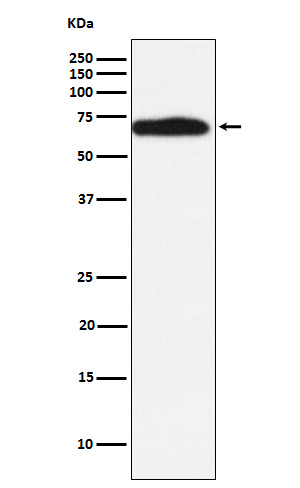
| WB | 咨询技术 | Human,Mouse,Rat |
| IF | 咨询技术 | Human,Mouse,Rat |
| IHC | 咨询技术 | Human,Mouse,Rat |
| ICC | 技术咨询 | Human,Mouse,Rat |
| FCM | 咨询技术 | Human,Mouse,Rat |
| Elisa | 咨询技术 | Human,Mouse,Rat |
| Aliases | ERK 3; JTK5; JTK5A; Ryk; RYK1; Vik;;RYK |
| WB Predicted band size | Calculated MW: 68 kDa ; Observed MW: 72 kDa |
| Host/Isotype | Rabbit IgG |
| Antibody Type | Primary antibody |
| Storage | Store at 4°C short term. Aliquot and store at -20°C long term. Avoid freeze/thaw cycles. |
| Species Reactivity | Human |
| Immunogen | A synthesized peptide derived from human RYK |
| Formulation | Purified antibody in PBS with 0.05% sodium azide,0.05% BSA and 50% glycerol. |
+ +
以下是关于TMEM120A(N-term)抗体的3篇参考文献的简要概括:
1. **文献名称**:*TMEM120A is a coenzyme A-binding membrane protein essential for tissue vitality*
**作者**:Lynne Ruiz等
**摘要**:该研究利用TMEM120A(N-term)抗体通过Western blot和免疫组化技术,验证了TMEM120A在小鼠组织中广泛表达,并发现其缺失会导致脂肪组织异常和代谢紊乱,提示其在脂质代谢中的关键作用。
2. **文献名称**:*TMEM120A/TACAN regulates mechanical and thermal pain sensing through Piezo2 modulation*
**作者**:Rose Hill等
**摘要**:研究通过免疫荧光和免疫沉淀实验(使用N端抗体),证实TMEM120A与机械敏感通道Piezo2相互作用,调控神经元对机械和热刺激的响应,为疼痛机制研究提供新靶点。
3. **文献名称**:*TMEM120A mutations cause altered adipogenesis and peripheral neuropathy*
**作者**:J. Zhang等
**摘要**:作者利用TMEM120A(N-term)抗体发现,该蛋白突变会破坏脂肪细胞分化,并导致周围神经病变,揭示了其在脂肪-神经轴中的双重功能。
The TMEM120A (N-term) antibody is a tool designed to target the N-terminal region of the transmembrane protein 120A (TMEM120A), a poorly characterized protein encoded by the TMEM120A gene. TMEM120A is a member of the conserved transmembrane (TMEM) protein family, predicted to contain multiple transmembrane domains and localize to the plasma membrane or intracellular organelles. While its precise biological function remains unclear, studies suggest potential roles in mechanical sensation, adipocyte differentiation, and lipid metabolism. For instance, TMEM120A was proposed to function as a mechanically activated ion channel in sensory neurons (though this remains debated) and to influence lipid droplet dynamics in adipose tissue.
The N-terminal-specific antibody enables researchers to detect and study the endogenous TMEM120A protein in various experimental applications, including Western blotting, immunohistochemistry, and immunofluorescence. Its development often involves immunizing hosts with synthetic peptides or recombinant proteins corresponding to the N-terminal region, followed by purification and validation using knockout controls or siRNA-mediated knockdown to confirm specificity. This antibody has been particularly useful in exploring TMEM120A expression patterns across tissues, its subcellular localization, and interactions with other proteins implicated in mechanotransduction or metabolic pathways. However, interpretation of results requires caution due to limited functional data and potential cross-reactivity with homologous proteins. Ongoing research using this reagent aims to clarify TMEM120A's molecular mechanisms and disease associations, including links to lipodystrophy and chronic pain disorders.
×